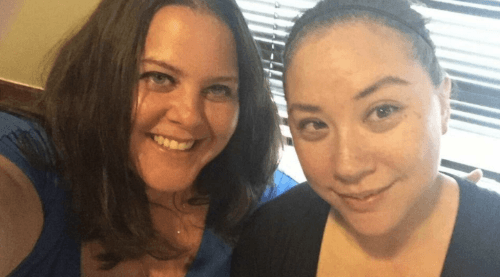
Hello from my summer road trip! I’m getting out of swampy DC and visiting new cities. I’m also feeling nicely removed from the political quagmire that is our current national nightmare.
First stop … Raleigh, North Carolina, and surrounding areas.
Also known as “The Triangle,” this area of central North Carolina is home to the State Capitol (in Raleigh), Duke University (in Durham), and UNC Chapel Hill (in … Chapel Hill). The region is lush with greenery and various creeks and rivers that make it naturally spectacular.
I was drawn to Raleigh by my best friend and long-time partner in crime, Sonia, who has been in my life for 28 years. Yikes! We’re old. Here we are celebrating her birthday last year:

We always have a ton of fun together and it was so fun to spend quality time with her and her family while I was in NC.
But I wasn’t just there for fun! I was working on client projects and networking with NC nonprofits the whole time.
What I learned is that, unsurprisingly, nonprofits in North Carolina face the same challenges as nonprofits everywhere. One theme that ran through all of my conversations was transition and adaptation—organizations are either going through transitions, adapting their business models for more sustainable growth, or have just weathered some significant change in leadership or structure.
Here are the groups I met with:
Community Purchasing Alliance. I connected with Felipe Witchger, CPA’s founder, through a mutual friend, but we also share the distinction of both being former employees at Groundswell, which organizes communities to use 100% clean, solar power through a shared cost model.
At CPA, Felipe has taken the community purchasing model to a co-op structure and uses it to leverage institutions’ (like churches and charter schools) purchasing power to get them the best deal on services they need to achieve their missions. For example, they helped a group of churches in DC save thousands on their trash removal contract by negotiating a switch from the market leading large vendor to a smaller, local company with better employment practices and more transparent contracts that don’t include hidden fees and charges.
CPA is approaching a period of growth and expansion, and they are thinking about how they will fund that growth. With their unconventional corporate structure, CPA presents an interesting case for a blended funding model. Their primary revenue comes from their client contracts (earned revenue), but they have also been successful with grant funding. And, as a co-op, the organization is wholly owned by its members, which is a different twist on typical membership organizations.
CPA is headquartered in Durham, NC, at ReCity, a nonprofit focused co-working space. ReCity is a light, bright, open space that inspires creativity and has lots of cool meeting space. Here’s a photo of the amazing Laura Pyatt, CPA’s dynamic leader of outreach and membership, hanging out in ReCity’s open seating area. And another of their awesome spaces for meetings and networking.


Off to a great start, a few days later I met with Melissa Radcliffe, Project Manager for Our Children’s Place of Coastal Horizons Center, a group that advocates for the children of incarcerated parents and provides training on how to serve them. Our Children’s Place used to be an independent organization, but they decided to merge with Coastal Horizons in 2016, an organization whose work on criminal justice—providing alternatives to incarceration, recidivism reduction, and facilitating reentry programs—allowed the new organization to tackle problems more holistically. It takes a lot of transparency and open communication between teams—and funders—to make sure that a transition like this is successful, and I have a lot of admiration for the folks at Children’s Place of Coastal Horizons Center. Together, after years of deep partnership, these organizations are poised to create deeper impact than they could on their own.
During my conversation with Melissa, I was shocked to learn that one in every 28 children in the United States has an incarcerated parent. Our Children’s Place helps these families navigate the complex and difficult path of caring for each other and staying connected. Learn more here.
Curious about the broader nonprofit sector, I reached out to Rob Maddrey, Director for Sustainability for the North Carolina Center for Nonprofits. Over coffee, we chatted about the funding landscape for nonprofits in NC and the role that the NC Center plays in the sector. Spoiler alert: there are a cadre of high profile foundation funders and a stable of strong corporate donors, and organizations compete for their attention. Sound familiar? One big takeaway from my conversation with Mr. Maddrey is that it seems more foundations in NC are focused on capacity-building than is typical in DC. This means that NC organizations may have more access to funds for vital organizational activities like strategic planning, board engagement, and fund development planning—all of which help them become more effective, strategic, and impactful.
Last, but certainly not least, I met with a number of staff from Youth Empowered Solutions! (YES!, for short). YES! Works across the country to engage young people in advocacy and policy change. They equip high school youth and their adult allies with the tools necessary to take a stand in their communities and create change that will positively impact adolescent health. They are committed to creating a society where empowered youth leaders work alongside adults to create just, equitable and thriving communities.
In conversations with Mary Beth Loucks-Sorrell, their Executive Director, and Parrish Ravelli, a friend from my former days at the School-Based Health Alliance, I learned about their recent transition from the founding executive director to Mary Beth. Transitioning from a founding executive director is a major milestone for any organization, and managing it successfully is a great accomplishment. YES! has been very busy recently, having both navigated that transition and adapted their organization to a blended revenue model that includes both philanthropic support and earned income through consulting services. They should feel very proud of all that they’ve accomplished!
These are just a few of the remarkable organizations that make up the North Carolina nonprofit landscape. What I enjoyed most about speaking with these organizations is hearing how they’ve all been able to navigate tough challenges and find new ways to spark positive change in their communities. I’m looking forward to learning more in future visits!
